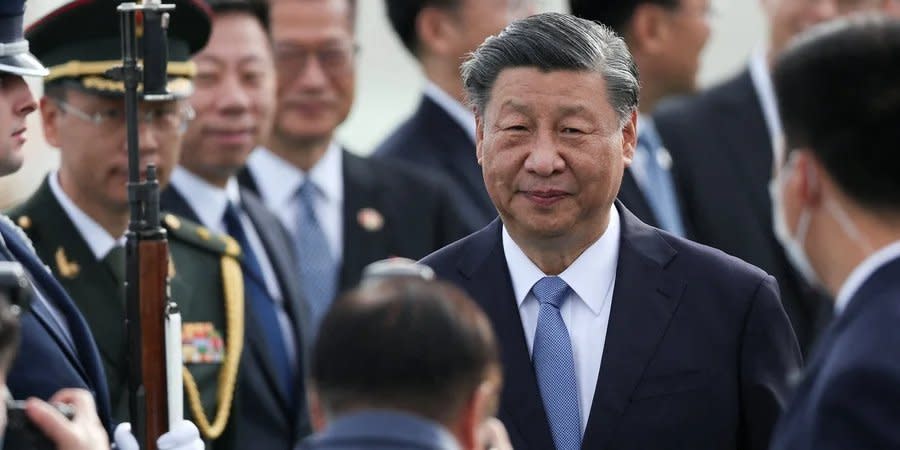Keeping an eye out for China's next move

- Oops!Something went wrong.Please try again later.
The scheduled meeting between Presidents Joe Biden and Xi Jinping must be considered in the context of its importance for the future of global peace.
It is necessary to have a balance of the world's heavyweights, the largest economies – and at the same time, the most prominent antagonists – the leader of the democratic world, the United States of America, and the totalitarian dictatorship of the People's Republic of China.
Despite the existence of many issues of bilateral cooperation and mutual counteraction, including the issue of Taiwan, economic relations, sanctions against the Chinese economy, protection of the national commodity producer by the United States, the activity of the Chinese navy, and tensions over Beijing's territorial claims in the South China and East China Seas, despite all these important topics, the most critical issues will still be the struggle for existence of Ukraine and Israel, and the role of Washington and Beijing in preventing the escalation of a threatening scenario.
There are two global problems, and both of them are under the patronage of Russia: the war against Ukraine by the aggressive Russian Federation and the war against Israel by the Hamas terrorist organization. The economy and Taiwan are still secondary issues because they are not so acute. They are mostly a matter of verbal sparring at the moment.
The world community will assess Ukraine's success in the war as a victory for democracy, a success for the anti-Kremlin coalition, a success for NATO, the EU, and the US, and ultimately a success for democratic countries that defend international law, justice and the right to live in the coordinate system of the twenty-first century.
The Chinese leader will spend three days in the United States
In this case, the possibility of the occupation of Taiwan, aggressive actions of the Chinese navy, and provocations against neighbors will decrease. China does not directly act against Ukraine, but does oppose democracies, in particular by pulling dictatorships closer to it. This effectively eliminates the possibility for China to be the leader of the Global South, and India is confidently taking over this position.
The Armed Forces of Ukraine not only defend the state but are also perhaps a key actor in the global agenda of the struggle for democracy, peace and freedom. Given the scale of the Russian-Ukrainian war, the issue of consolidation to help Ukraine comes to the fore.
China recognizes the need to preserve borders. This is a crucial point from which a dialog can begin. Both leaders are pushed to succeed in the negotiations by the problematic internal situation in their countries. Each has his own. Biden has new elections on the horizon, while Xi is facing a downturn in the economy, sanctions, repression in the country, and distance from the West. Success in the negotiations will mean an increase in the rating of both Biden and Xi. However, excessive optimism is inappropriate here, as the views of both countries, and both leaders, are very different.
Biden's presidency has seen many international challenges. These include the withdrawal of US troops from Afghanistan (although the decision was made under the previous president) and the two wars that have been going on since February 24, 2022, against Ukraine and since October 7, 2023, against Israel.
Despite being China's most popular president and leader since Mao Zedong, Xi Jinping's problems are even more profound. After all, COVID has undermined his rating, his relations with the West look like a failure of China's foreign policy, and tensions exist with most neighboring countries. The slowdown in economic growth is evident, international business is slowly leaving China, and the internal struggle is also incomprehensible to external observers. Meanwhile, both the Minister of Defense and the Minister of Foreign Affairs disappeared from the political horizon in a short period of time.
The Chinese leader will spend three days in the United States. The meeting will take place in the United States. Objectively, this strengthens Biden's position. However, Xi is officially going to the Asia-Pacific Economic Cooperation (APEC) summit, which is ongoing in San Francisco from November 11 to 17. The presidents met in the San Francisco Bay Area. The November 15 meeting will be only the second time they have met face-to-face during Biden's presidency.
Analysts predict that the summit could lead to some modest achievements – perhaps restoring military ties and limiting the flow of Chinese-made fentanyl. Neither side expects any breakthroughs, but rather stabilization of relations.
Read also: What will Putin and Xi Jinping get from their crucial meeting
The United States used to confront the communist Soviet Union, and today, we need to confront communist China. Therefore, the world is returning to bipolarity. This is the future for the United States and China, for whom this meeting could be an impetus for a more peaceful coexistence. Their economies are interdependent. This is the basis for negotiations.
China can control the Russian Federation as its raw material appendage, so Biden is seeking an understanding with Beijing so that he can also, in turn, use China to influence Putin and pacify him, especially since China favors respecting international law, at least in words, if not deeds.
The meeting between Biden and Xi could be a turning point in terms of revising US-China relations. Beijing needs an economic boost, and Washington can help it with this.
A change in China's rhetoric on the Russian-Ukrainian war could solidify the agreements reached between Beijing and Washington.
We’re bringing the voice of Ukraine to the world. Support us with a one-time donation, or become a Patron!
Read the original article on The New Voice of Ukraine

